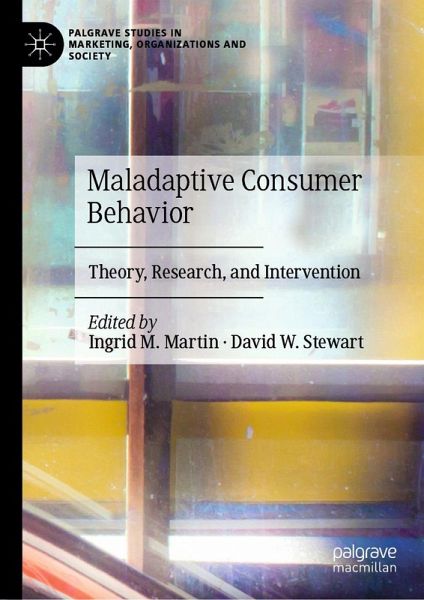
Maladaptive Consumer Behavior (eBook, PDF)
Theory, Research, and Intervention
Redaktion: Martin, Ingrid M.; Stewart, David W.
Versandkostenfrei!
Sofort per Download lieferbar
136,95 €
inkl. MwSt.
Weitere Ausgaben:

PAYBACK Punkte
68 °P sammeln!
This edited volume provides a marketing perspective on maladaptive consumer behavior, especially behavior with dysfunctional consequences that does not have its origins in physical addiction. It brings together contributions of leading scholars who have expertise in various forms of maladaptive consumption. The chapters address specific manifestations of maladaptive consumption, such as those related to food, alcoholic beverages, online gaming, and media consumption, among others, with an emphasis on behaviors that are not traditionally regarded as arising from physical addiction.Further, the ...
This edited volume provides a marketing perspective on maladaptive consumer behavior, especially behavior with dysfunctional consequences that does not have its origins in physical addiction. It brings together contributions of leading scholars who have expertise in various forms of maladaptive consumption. The chapters address specific manifestations of maladaptive consumption, such as those related to food, alcoholic beverages, online gaming, and media consumption, among others, with an emphasis on behaviors that are not traditionally regarded as arising from physical addiction.
Further, the book includes chapters that focus more broadly of definitional and conceptual issues, methodological approaches, implications for intervention and regulation, and the value judgments inherent in the identification and classification of behaviors as "maladaptive." It examines numerous alternative theories of maladaptive consumption and places such behavior in a larger market context.
Taken together, the contributions in this volume (1) describe the general phenomenon of maladaptive consumption, (2) describe specific manifestations of maladaptive consumption, (3) identify issues of research methodology and definition related to the study of maladaptive consumption, and (4) address relevant interventions, regulations, and public policy issues. It will appeal to scholars interested in maladaptive consumption behaviors and their treatments as well as consumer behavior more generally across multiple fields, including marketing, clinical psychology, social work, and public health.
Further, the book includes chapters that focus more broadly of definitional and conceptual issues, methodological approaches, implications for intervention and regulation, and the value judgments inherent in the identification and classification of behaviors as "maladaptive." It examines numerous alternative theories of maladaptive consumption and places such behavior in a larger market context.
Taken together, the contributions in this volume (1) describe the general phenomenon of maladaptive consumption, (2) describe specific manifestations of maladaptive consumption, (3) identify issues of research methodology and definition related to the study of maladaptive consumption, and (4) address relevant interventions, regulations, and public policy issues. It will appeal to scholars interested in maladaptive consumption behaviors and their treatments as well as consumer behavior more generally across multiple fields, including marketing, clinical psychology, social work, and public health.
Dieser Download kann aus rechtlichen Gründen nur mit Rechnungsadresse in A, B, BG, CY, CZ, D, DK, EW, E, FIN, F, GR, HR, H, IRL, I, LT, L, LR, M, NL, PL, P, R, S, SLO, SK ausgeliefert werden.












